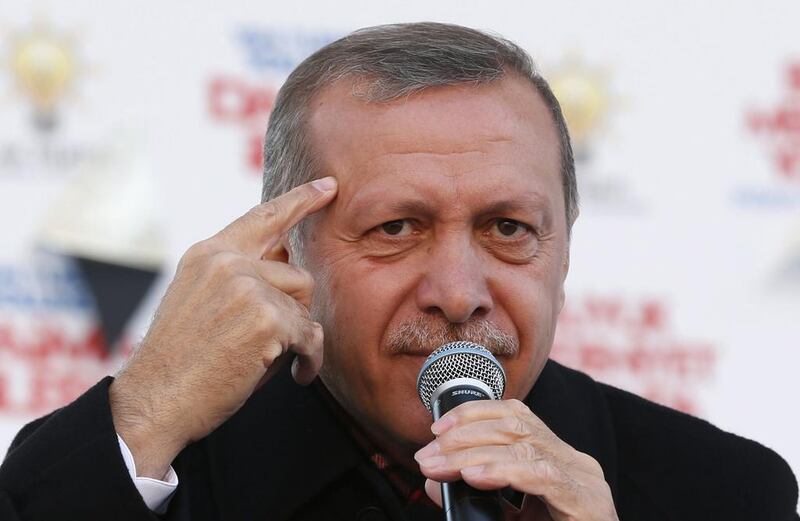ISTANBUL // As Turkey’s prime minister Recep Tayyip Erdogan faces a key test of his 11-year rule in elections on Sunday, Middle Eastern countries are watching for clues about the political fortunes of one of the region’s most powerful leaders, analysts say.
His government has differed with other regional powers on the crisis in Egypt, relations with Iran, and the civil war in Syria. Observers say some in the region would be glad to see Mr Erdogan humbled by the vote.
While Mr Erdogan’s rule is not officially at stake in today’s municipal poll, the elections mark the first test of his political strength since a wave of anti-government unrest last year and since corruption allegation against his cabinet and himself began to surface in December.
Polls show Mr Erdogan’s Islamist-leaning Justice and Development Party (AKP) is expected to remain Turkey’s strongest political force, with a share of 40 per cent or more of the vote. In 2011, the AKP won about 50 per cent of the vote in parliamentary elections. The party received 38.8 per cent in the last municipal elections in 2009.
But Cengiz Aktar, a senior scholar at the Istanbul Policy Center of the private Sabanci University, said the corruption allegations meant that Mr Erdogan would be politically weakened even if the AKP managed to contain electoral losses.
“We may face a very serious problem of legitimacy regarding the prime minister,” he said.
Fethi Acikel, a political scientist at Ankara University, said Mr Erdogan’s foreign policy had “antagonised many neighbouring countries in the region”. His leadership was considered a “destabilising and unpredictable element both at home and abroad”, Mr Acikel said.
“No one will cry for him,” Mr Aktar said. Governments across the region “are not looking forward to having to deal with him for another 20 years”.
Only days before the elections, Mr Erdogan’s government was critisised internationally for blocking access to YouTube, after an audio recording of high-ranking officials allegedly discussing ways to provoke an excuse for military intervention in Syria was posted on the site.
Twitter remains blocked in Turkey despite two court rulings against a recent ban.
While Mr Erdogan’s crackdown on domestic dissent has upset the West, his foreign policy has angered regional powers even more.
Last year, he antagonised many Gulf leaders by demanding the reinstatement of former Egyptian president Mohammed Morsi after he was removed by the country’s military following mass protests against his rule. Mr Morsi, a member of the Muslim Brotherhood, was an ally of Mr Erdogan, but was considered a threat by many Gulf states.
Egypt’s military-backed interim government expelled the Turkish ambassador last year and in response Ankara declared Egypt’s envoy persona non grata.
“It is obvious that some Gulf countries, especially Saudi Arabia and the United Arab Emirates, have a totally different foreign policy on Egypt and the fate of Muslim Brotherhood,” said Nebahat Tanriverdi O Yasar, an analyst at the Anakara-based Center for Middle Eastern Strategic Studies (Orsam).
These differences “are likely to become the biggest psychological barrier to bolster ties between Turkey and these Gulf countries”, Ms Tanriverdi said.
Other frictions include Mr Erdogan’s alleged support of Islamist militants in Syria and a recent rapprochement with Turkey’s eastern neighbour Iran, a major regional rival of Saudi Arabia. Mr Erdogan called Tehran a “second home” when he visited in January.
On March 3, Turkish opposition newspaper Cumhuriyet reported that Saudi Arabia had turned down a proposed visit by Turkish defence minister Ismet Yilmaz. The daily also reported that Riyadh had cancelled talks about the purchase of surveillance drones from Turkey.
In August last year, Turkey’s energy minister Taner Yildiz accused Abu Dhabi National Energy (Taqa) of political motives after the company delayed a US$12 billion (Dh44bn) coal mining and power plant project in Turkey.
“I wish that Taqa company’s choices weren’t based on political reasons,” Mr Yildiz said. “It seems like the latest incidents in Egypt and Syria have put Taqa in a position to make choices about its energy investments from its perspective.”
Tensions are not expected to end soon.
How much of an impact Mr Erdogan’s policies have had on his domestic popularity will been seen in Sunday’s vote.
In Esenyurt, a working class district of Istanbul, walkways were plastered with campaign posters and vans drove through the streets blaring elections slogans.
In a tea house, Erdogan supporters said their decision to vote for the prime minister’s party would not be changed by recent events.
“What would Twitter have done if someone had wiretapped the US president?” one of the men said.
foreign.desk@thenational.ae





